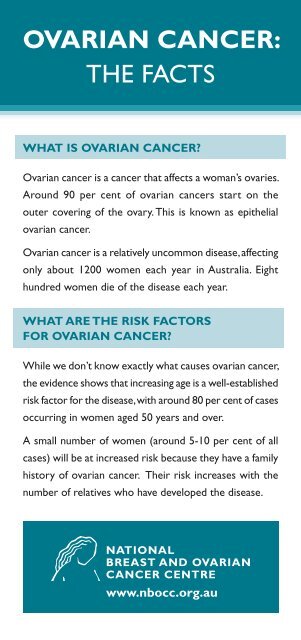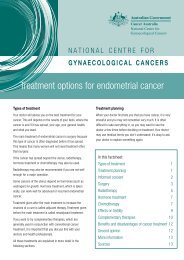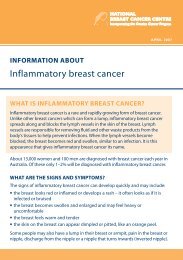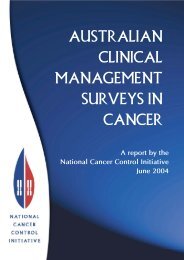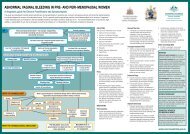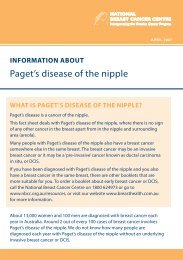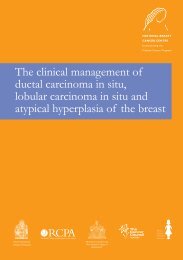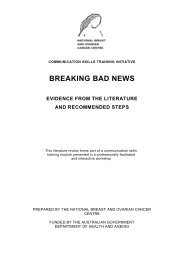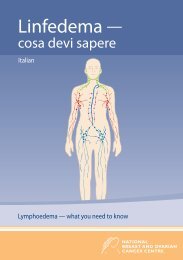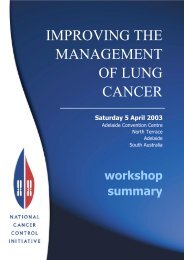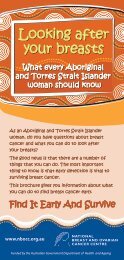OVARIAN CANCER: the facts - Cancer Australia
OVARIAN CANCER: the facts - Cancer Australia
OVARIAN CANCER: the facts - Cancer Australia
Create successful ePaper yourself
Turn your PDF publications into a flip-book with our unique Google optimized e-Paper software.
Ovarian <strong>Cancer</strong>:<br />
<strong>the</strong> <strong>facts</strong><br />
what is ovarian cancer<br />
Ovarian cancer is a cancer that affects a woman’s ovaries.<br />
Around 90 per cent of ovarian cancers start on <strong>the</strong><br />
outer covering of <strong>the</strong> ovary. This is known as epi<strong>the</strong>lial<br />
ovarian cancer.<br />
Ovarian cancer is a relatively uncommon disease, affecting<br />
only about 1200 women each year in <strong>Australia</strong>. Eight<br />
hundred women die of <strong>the</strong> disease each year.<br />
What are <strong>the</strong> risk factors<br />
for ovarian cancer<br />
While we don’t know exactly what causes ovarian cancer,<br />
<strong>the</strong> evidence shows that increasing age is a well-established<br />
risk factor for <strong>the</strong> disease, with around 80 per cent of cases<br />
occurring in women aged 50 years and over.<br />
A small number of women (around 5-10 per cent of all<br />
cases) will be at increased risk because <strong>the</strong>y have a family<br />
history of ovarian cancer. Their risk increases with <strong>the</strong><br />
number of relatives who have developed <strong>the</strong> disease.<br />
www.nbocc.org.au
What are <strong>the</strong> symptoms OF ovarian<br />
cancer and WHAT CAN YOU DO<br />
Symptoms of ovarian cancer are often vague and can<br />
mimic those of o<strong>the</strong>r disorders. This can make ovarian<br />
cancer difficult to diagnose in its early stages. A Pap smear<br />
cannot be used to detect ovarian cancer.<br />
The best thing women can do is to be aware of <strong>the</strong><br />
symptoms that may indicate ovarian cancer and see <strong>the</strong>ir<br />
GP if <strong>the</strong>y experience any unusual and persistent changes.<br />
The most common symptoms that may indicate ovarian<br />
cancer are:<br />
• abdominal bloating/feeling full<br />
• appetite loss<br />
• unexplained weight gain<br />
• constipation<br />
• heartburn<br />
• back pain<br />
• frequent urination<br />
• abdominal/pelvic pain<br />
• fatigue.<br />
These symptoms can also be present in o<strong>the</strong>r illnesses.<br />
It is important that you have any unusual or persistent<br />
symptoms investigated. In order to establish <strong>the</strong> cause of<br />
your symptoms your GP may refer you for fur<strong>the</strong>r tests<br />
such as an ultrasound.<br />
For more information go to<br />
www.ovariancancerprogram.org.au<br />
Produced by <strong>the</strong> National Breast <strong>Cancer</strong> Centre* 2006<br />
Funded by <strong>the</strong> <strong>Australia</strong>n Government Department of Health and Ageing.<br />
* In February 2008, National Breast <strong>Cancer</strong> Centre incorporating <strong>the</strong> Ovarian <strong>Cancer</strong> Program<br />
(NBCC) changed its name to National Breast and Ovarian <strong>Cancer</strong> Centre (NBOCC).<br />
OCL 10/06


